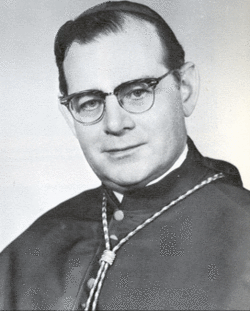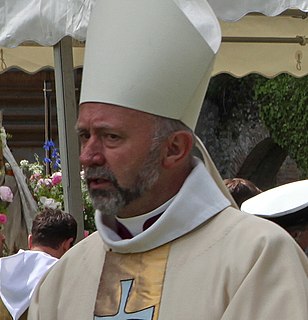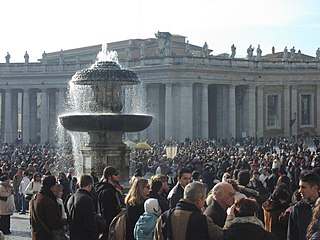Related Research Articles

The Church of England is the established Christian church in England, and the mother church of the international Anglican Communion. It traces its history to the Christian church recorded as existing in the Roman province of Britain by the 3rd century and to the 6th-century Gregorian mission to Kent led by Augustine of Canterbury.

A curate is a person who is invested with the care or cure (cura) of souls of a parish. In this sense, "curate" correctly means a parish priest; but in English-speaking countries the term curate is commonly used to describe clergy who are assistants to the parish priest. The duties or office of a curate are called a curacy.
An ecclesiastical court, also called court Christian or court spiritual, is any of certain courts having jurisdiction mainly in spiritual or religious matters. In the Middle Ages these courts had much wider powers in many areas of Europe than before the development of nation states. They were experts in interpreting canon law, a basis of which was the Corpus Juris Civilis of Justinian which is considered the source of the civil law legal tradition.

Since the 1990s, the Anglican Communion has struggled with controversy regarding homosexuality in the church. In 1998, the 13th Lambeth Conference of Anglican bishops passed a resolution "rejecting homosexual practice as incompatible with Scripture". However, this is not legally binding. "Like all Lambeth Conference resolutions, it is not legally binding on all provinces of the Communion, including the Church of England, though it commends an essential and persuasive view of the attitude of the Communion." "Anglican national churches in Brazil, South Africa, South India, New Zealand and Canada have taken steps toward approving and celebrating same-sex relationships amid strong resistance among other national churches within the 80 million-member global body. The Episcopal Church in the U.S. has allowed same-sex marriage since 2015, and the Scottish Episcopal Church has allowed same-sex marriage since 2017." "Church of England clergy have appeared to signal support for gay marriage after they rejected a bishops' report which said that only a man and woman could marry in church." The Church of England's 2019 General Synod was set to discuss a diocesan motion "to create a set of formal services and prayers to bless those who have had a same-sex marriage or civil partnership". At General Synod in 2019, the Church of England announced that same-gender couples may remain married and recognised as married after one spouse experiences a gender transition provided that the spouses identified as opposite genders at the time of the marriage.
A suffragan bishop is a type of bishop in some Christian denominations.
Defrocking, unfrocking, or laicization of clergy is the removal of their rights to exercise the functions of the ordained ministry. It may be grounded on criminal convictions, disciplinary problems, or disagreements over doctrine or dogma, but may also be done at their request for personal reasons, such as running for civil office, taking over a family business, declining health or old age, desire to marry against the rules for clergy in a particular church, or an unresolved dispute. The form of the procedure varies according to the Christian denomination concerned. The term defrocking implies forced laicization for misconduct, while laicization is a neutral term, applicable also when clergy have requested to be released from their ordination vows.
Clerical celibacy is the requirement in certain religions that some or all members of the clergy be unmarried. Clerical celibacy also requires abstention from deliberately indulging in sexual thoughts and behavior outside of marriage, because these impulses are regarded as sinful.

Marriage in the Catholic Church, also known as holy matrimony, is the "covenant by which a man and woman establish between themselves a partnership of the whole of life and which is ordered by its nature to the good of the spouses and the procreation and education of offspring", and which "has been raised by Christ the Lord to the dignity of a sacrament between the baptised." Catholic matrimonial law, based on Roman law regarding its focus on marriage as a free mutual agreement or contract, became the basis for the marriage law of all European countries, at least up to the Reformation.

The hierarchy of the Catholic Church consists of its bishops, priests, and deacons. In the ecclesiological sense of the term, "hierarchy" strictly means the "holy ordering" of the Church, the Body of Christ, so to respect the diversity of gifts and ministries necessary for genuine unity.
The Anglican Church of Southern Africa, known until 2006 as the Church of the Province of Southern Africa, is the province of the Anglican Communion in the southern part of Africa. The church has twenty-five dioceses, of which twenty-one are located in South Africa, and one each in Eswatini, Lesotho, Namibia and Saint Helena. In South Africa, there are between 3 and 4 million Anglicans out of an estimated population of 45 million.

Peter Alan Broadbent, known as Pete Broadbent, is an English Anglican bishop. He served as the Bishop of Willesden, an area bishop in the Church of England Diocese of London for twenty years, 2001–2021. During the vacancy in the diocesan see from 2017–2018, he served as Acting Bishop of London.

The Anglican ministry is both the leadership and agency of Christian service in the Anglican Communion. "Ministry" commonly refers to the office of ordained clergy: the threefold order of bishops, priests and deacons. More accurately, Anglican ministry includes many laypeople who devote themselves to the ministry of the church, either individually or in lower/assisting offices such as lector, acolyte, sub-deacon, Eucharistic minister, cantor, musicians, parish secretary or assistant, warden, vestry member, etc. Ultimately, all baptized members of the church are considered to partake in the ministry of the Body of Christ.

In the Catholic Church, a bishop is an ordained minister who holds the fullness of the sacrament of holy orders and is responsible for teaching doctrine, governing Catholics in his jurisdiction, sanctifying the world and representing the Church. Catholics trace the origins of the office of bishop to the apostles, who it is believed were endowed with a special charism by the Holy Spirit at Pentecost. Catholics believe this special charism has been transmitted through an unbroken succession of bishops by the laying on of hands in the sacrament of holy orders.

Gerald Francis O'Keefe was a 20th-century bishop of the Catholic Church in the United States. He served as auxiliary bishop for the Archdiocese of Saint Paul in the state of Minnesota from 1961 to 1966 and bishop of the Diocese of Davenport in the state of Iowa from 1966 to 1993.
Edward Holland is a retired Anglican bishop, who was the Suffragan Bishop in Europe and then the area Bishop of Colchester. He is now an honorary assistant bishop in both the Diocese of London and the Diocese in Europe.

John Frank Ford is a retired British Anglican bishop. From 2013 to 2019 he was the Bishop of The Murray in the Anglican Church of Australia. From 2005 to 2013, he was the Bishop of Plymouth, a suffragan see in the Diocese of Exeter, England.

The ordination of women in the Anglican Communion has been increasingly common in certain provinces since the 1970s. Several provinces, however, and certain dioceses within otherwise ordaining provinces, continue to ordain only men. Disputes over the ordination of women have contributed to the establishment and growth of progressive tendencies, such the Anglican realignment and Continuing Anglican movements.

This is a glossary of terms used within the Catholic Church.

Catholic laity are the ordinary members of the Catholic Church who are neither clergy nor recipients of Holy Orders or vowed to life in a religious order or congregation. Their mission, according to the Second Vatican Council, is to "sanctify the world".

Christopher "Chris" Lowson is a retired British Anglican bishop. He served as Bishop of Lincoln, 2011–2021.
References
- ↑ "Supporting the Ministry of Retired Clergy" (DOC). Deployment, Remuneration and Conditions of Service Committee. London: Archbishops' Council. 12 April 2007. p. 7. Retrieved 10 April 2012.
- ↑ "On Being A Reader – What is a Reader?" (PDF). London: Central Readers' Council of the Church of England. pp. 3, 10. Retrieved 10 April 2012.
- ↑ "Home > About Us > Structure > Legal Services > Frequently Asked Questions". The Church of England. London: Archbishops' Council . Retrieved 10 April 2012.
- ↑ Strudwick, Patrick (5 December 2015). "This Is What Happened to the First Priest To Marry Another Man". BuzzFeed News. Retrieved 8 February 2021.